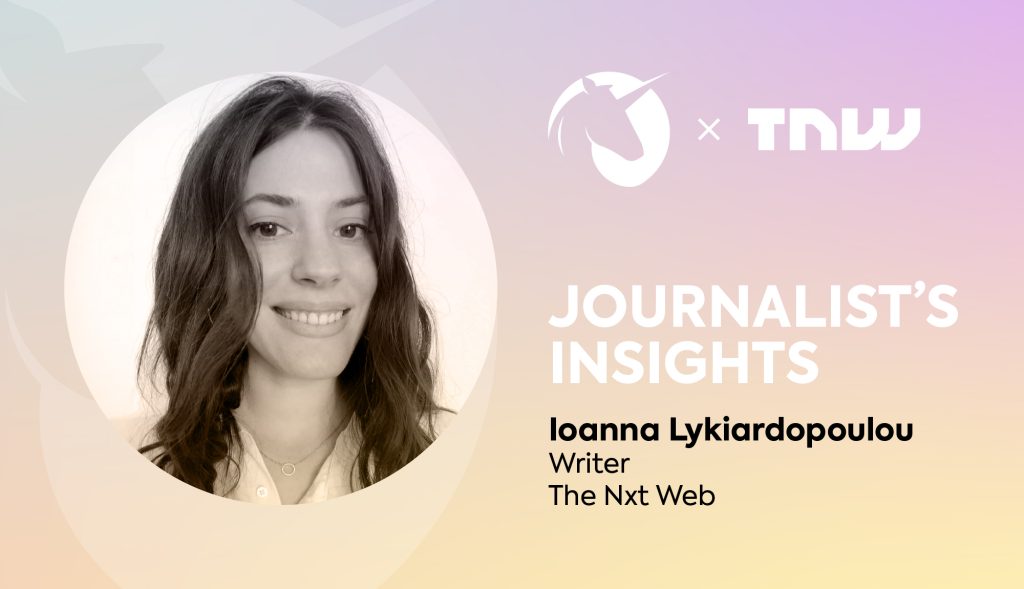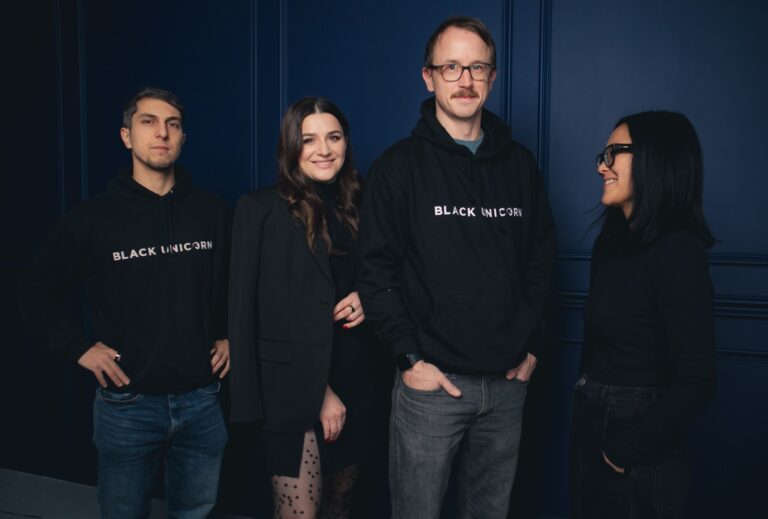For today’s instalment of Journalist’s Insights, we sit down with Ioanna Lykiardopoulou from The Next Web, the Amsterdam-based global tech outlet that is, as they themselves say, a lot more than an outlet. As you already know, central to our Journalist’s Insights is getting to know the journalist themselves, the people crafting the stories of the tech and startup landscape. Our aim is to illuminate the person behind the byline. Hailing from the birthplace of Western civilisation to covering the stories about latest frontiers in tech innovation, Ioanna gives as a window into her life as a journalist.
We also cover a range of topics to give you actionable advice. From her involvement with The Next Web and her journalistic interests to effective strategies for pitches, you won’t have any excuses for sending her a bad pitch, guaranteed! Happy reading!
INTRO
Where are you from and where are you based?
Ioanna Lykiardopoulou: I’ve been born and raised in Athens, but I’ve been living in Leiden for five years now — time passes very fast!
What are some of your favourite / less favourite things about living in Amsterdam?
Ioanna: Leiden is like a miniature of Amsterdam, but without the hustle. It’s beautiful and picturesque with a stunning city centre, and you can be anywhere you want within a few minutes of cycling or walking. While it’s a very vibrant city, it’s also quite peaceful which I’ve really come to appreciate. On the downside, it’s very small, so after living there for some years, you start feeling your choices in restaurants or entertainment are rather limited.
What’s the path that brought you to the world of journalism?
Ioanna: Journalism came naturally to me. I’ve been in love with writing since I can remember, and I even took part in many writing competitions as a highschool student. After graduation, I was drawn to language studies and thought that this was the field that I would stay in. But then I had my first contact with journalism. When I was around 22, I worked part-time for an online magazine in Greece, covering topics on society, literature, and the arts. I felt a click back then, which I ignored, until I decided to properly pursue a career in journalism in the Netherlands.
And how did you end up joining The Next Web?
Ioanna: I joined TNW in 2021, after applying for an open position. I started as an intern. Technology wasn’t really my thing back then and I was a bit hesitant at first, but I quickly became passionate about innovation and tech’s potential to change the world for the better.
In 2024, what is The Next Web all about?
Ioanna: We’re all about voicing and connecting the European tech ecosystem and we support the global competitiveness of Europe’s innovation with our technology-focused coverage. Our goals are to connect the main stakeholders of the ecosystem and highlight the technology at the foundation of the industry, while answering the question, “what’s next in tech?” We want to be the place to go for both big and emerging players whether they’re looking for niches, industry news, technological developments, or inspiring founding stories. And, of course, don’t forget about the TNW Conference on June 20–21 in Amsterdam.
WORK LIFE AND PR ADVICE
What stories are newsworthy for TNW? And for you in your role?
Ioanna Lykiardopoulou: We’ll look at any story that has a technology angle and that’s relevant to our audience of startups, investors, corporate innovators, and policy makers. The main verticals that we cover are deep tech, sustainability, fintech, startup ecosystems, and future of work.
Personally, I have a special interest in stories related to AI, medtech, biotech, deeptech, and policy. I’m also very passionate about social impact-enabling technologies, and I have a soft spot for technologies intertwined with language and education.
What other hygiene or proof points do you look at if you are considering a pitch from a startup the first time they reach out?
Ioanna: For me, the most important aspect is impact. Other key points are the product/service itself (in our case at TNW, the technology), the founders’ background and faith in their mission, and the differentiating factor. Of course, a good, clear website also helps.
What does your average day look like?
Ioanna: My days vary, but overall I’d say they’re about staying up to date with the latest advancement in the tech sector overall and the European ecosystem in particular, connecting with my network, conducting research and interviews, and, of course, writing articles — which takes the biggest part of my day.
How busy is your inbox and how do you manage it?
Ioanna: Let’s say, very busy. I prioritise existing conversations, speed read email subjects, and overall organise emails with labels, according to industry, topic, people etc.
Is the press release dead? (Or useful in certain cases?)
Ioanna: No, I wouldn’t say the press release is dead. In fact, press releases can be very useful in providing important information or news, as long as the content is insightful and not a mere ad.
How do you prefer to receive information about news or other pitches?
Ioanna: The form doesn’t really matter to me. What I find important is clarity and coherence. Summaries in the beginning of news or pitches help as well.
What do the best pitches you’ve received have in common?
Ioanna: I think it comes down to four things: clarity, mission, vision, and potential impact.
What is your biggest pet peeve about PRs or the PR industry?
Ioanna: The perception that I’m required to write a story. As much as I appreciate receiving information or pitches on a topic or company, this doesn’t mean that I will necessarily write an article about it — which depends on several other factors.
The best PR pros work in which ways?
Ioanna: First of all, they understand the clients’ needs, journey, and industry — and use the right tools to communicate their mission to a broad audience. They also know how to strategise and curate compelling content that’s factual and meaningful.
When it comes to media relations, they understand that relationships with journalists aren’t transactional, but built on collaboration and mutual respect. This also means helping their clients appreciate that journalists don’t operate as sounding boards, but are committed to bringing unbiased and unsolicited perspectives.
ABOUT IOANNA
What do you love about being a journalist?
Ioanna Lykiardopoulou: There are so many aspects to it: the creativity, the continuous learning, and the opportunity to meet inspiring people, keep the public informed, share ideas, and even ask the hard questions. What inspires me the most is being able to tell stories that matter.
What stories do you enjoy writing about the most?
Ioanna: I would say the stories that I believe are impactful, can provide different perspectives, and that are about causes close to my heart.
What excites you in the world of startups?
Ioanna: Startups are a very exciting part of the business world. Sometimes they fail, but sometimes they succeed — and when they do, they can even change the world. I’m always fascinated by the resilience and the “dreaming big” character of startups. We need more of that.
What are the biggest challenges facing humanity that startups can dream of taking on?
Ioanna: Well, climate change is definitely one. Improving healthcare, education, and equality globally are also challenges startups can tackle, especially through innovative technologies such as AI.
CLOSING OFF
What does the future hold for The Next Web?
Ioanna Lykiardopoulou: TNW is growing, and we’re always looking for new ways to fulfil our mission of serving the European tech community. As we keep covering the most important stories on the website, we’re also growing new formats, from the podcast we recently launched, to our flagship weekly newsletter.
You can expect to see us doubling down on the most interesting verticals, or perhaps niches that we believe will play a big role in the mainstream tech industry. Being a Financial Times company, you’ll also see us leverage our respective expertise even more.
What is your favourite holiday type?
Ioanna: The type of holiday that helps you disconnect. So for me that is, a remote cabin somewhere in nature, preferably in winter and with snow all around. Or my holiday home in Greece next to the beach.
Favourite cuisine?
Ioanna: I’ll be biassed and say Greek cuisine, but I also love Italian food.
Hobbies?
Ioanna: It’ll probably sound like a cliche, but my favourite hobbies are reading, creative writing, and travelling.
Have you seen the rest of our blog yet? Here is more from our Journalist’s Insights series:
Startups, the Media and CEE with Zosia Wanat from Sifted
Connecting the European startup scene with Patricia Allen of EU-Startups
Busting Journalism Myths with Lindsay Dodgson from Business Insider
Diving into fintech journalism with Doug Mackenzie from Fintech Finance
Securing media placements during COVID-19 with Yessi Bello-Perez from The Next Web
From PR to Media With Remco Janssen of Silicon Canals
The importance of regional media for startups, with Anda Asere from Labs of Latvia



